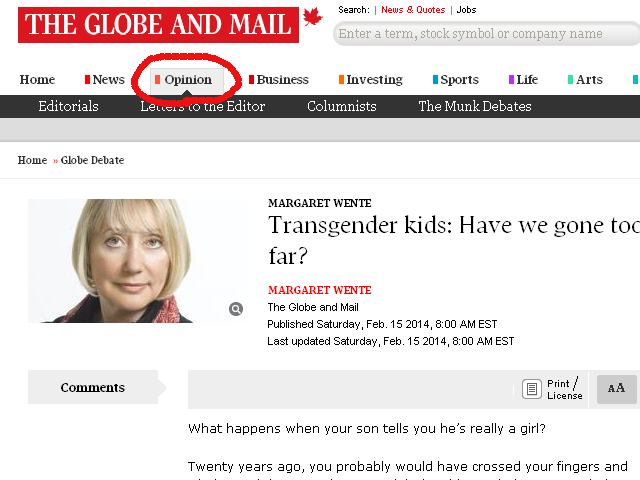Yes, the article has a bit of a snarky tone at points, but then she's a journalist not a scientist and she's trying to write in a provocative and entertaining fashion. I wouldn't hold it to the standards of a scientific article on it, but it does bring up good points. In the previously referred to thread I started, I was criticized for insufficiently sensitive language and for not citing anything in the topic.
A "journalist" who has neither the first-hand experience in what it means to be transgender, nor the scientific/psychological background on the matter, and who chooses to write "provocative" (i.e. offensive) opinions, is the very very worst starting point for a good discussion on the subject. Or on any subject that is sensitive.
There's nothing entertaining about more ignorant commentary on a group of people who are fundamentally misunderstood by most of us, often because we heard high-held opinions riddled with ignorance and misconceptions, misconceptions that have caused everything from grave discomfort to death. When you live your life having to explain yourself to people who think they know who you are better than you do, when you face all kinds of insults and abuse (sometimes well-meant, or so they say), the last thing you need is another person who happened to grow an opinion they found entertaining and provocative without actually having that much of a clue. I'd rather take the words of someone with personal experience.
Even if you're supportive and you've done a bit of research on this, it's still very easy to inadvertently write something that comes out as offensive, ignorant and dead obvious, and leads your readers in the wrong direction. To add snarky comments on top is a very bad idea. I've recently realised that I should stay queiter on the subject, as I have inadvetently written things that are insensitive. And not because I didn't understand what I was writing about, but because my lack of intimate knowledge prevented me from noticing subtleties that didn't seem to matter on the surface, but made a great deal of actual difference. And I am a dumb forum user, to do this under the veil of journalism is irresposible.
When I read things like "It is now fashionable to embrace your diverse child." I can't but roll my eyes. Since the only known cases of parents actually trying to force children into the wrong gender are when the children are actually transgender, you can read that sentence in only one way - a snark disapproval of parents who are accepting who their child is. If your child happens to be "diverse", what are you supposed to do, make them conform with societal expectations?! That might be an acceptable language when you're writing casual commentary on what people eat, but here it is utterly unacceptable.
She might have been meaning to be supportive (doubtful), but it's not a subject where you can be without carefully thinking about what you're saying, because otherwise one ends up writing such bullshit that helps nobody. You mean to help, and you end up saying that it's fashionable to not force your child into depression. Yeah, right. If one thinks that's fashionable, they should read or watch some accounts about actual transgender children. There's nothing fashionable about it.


